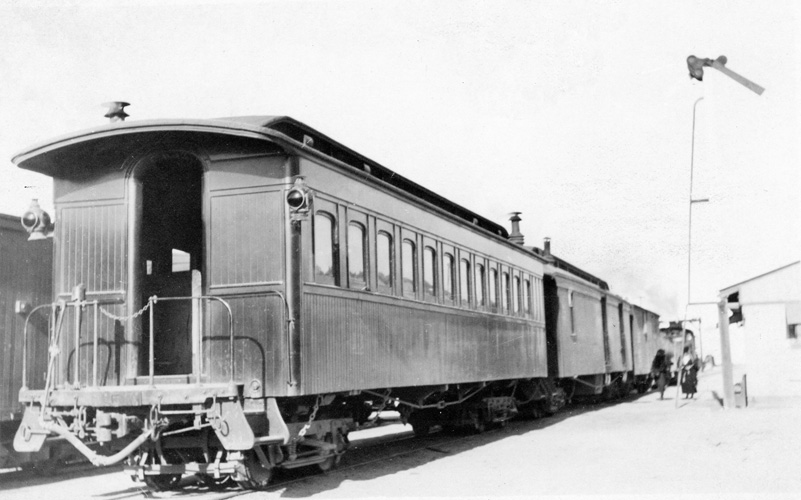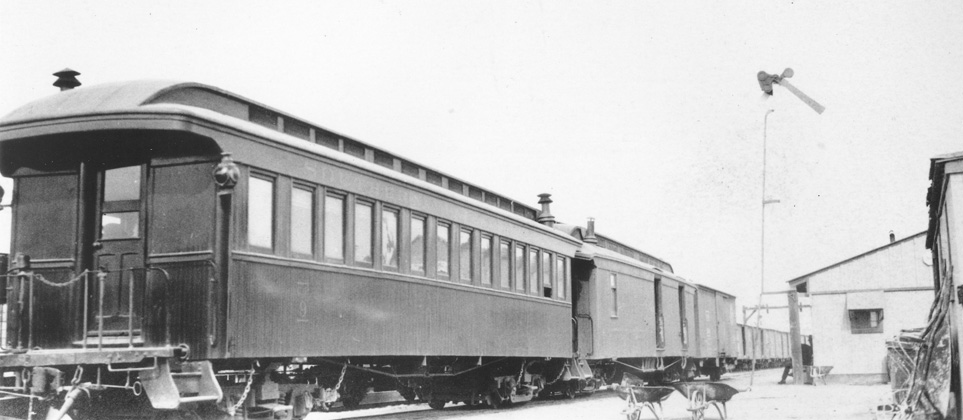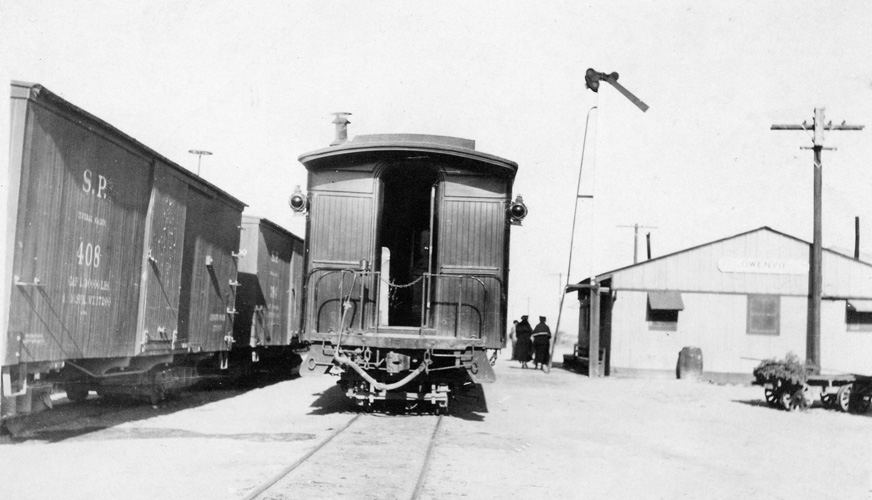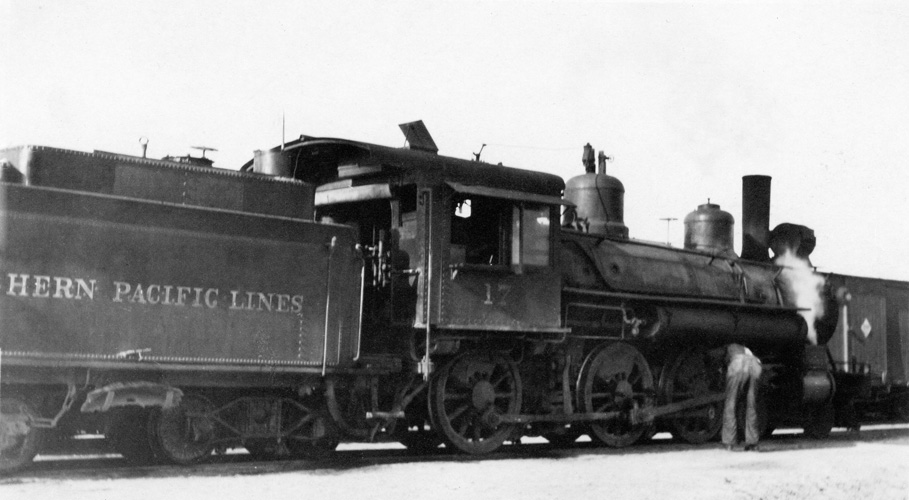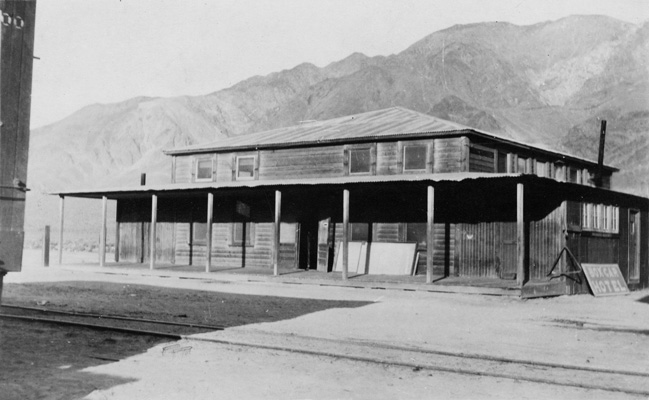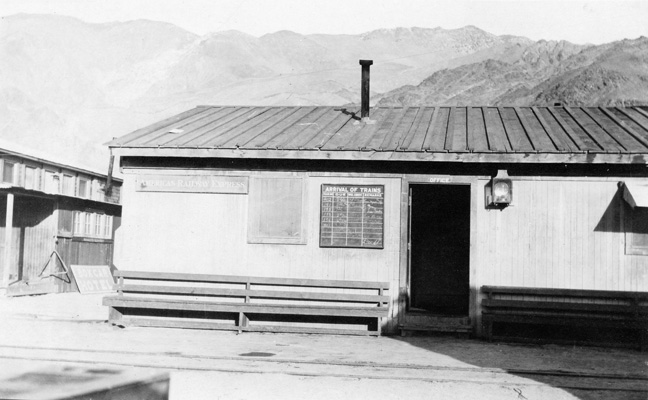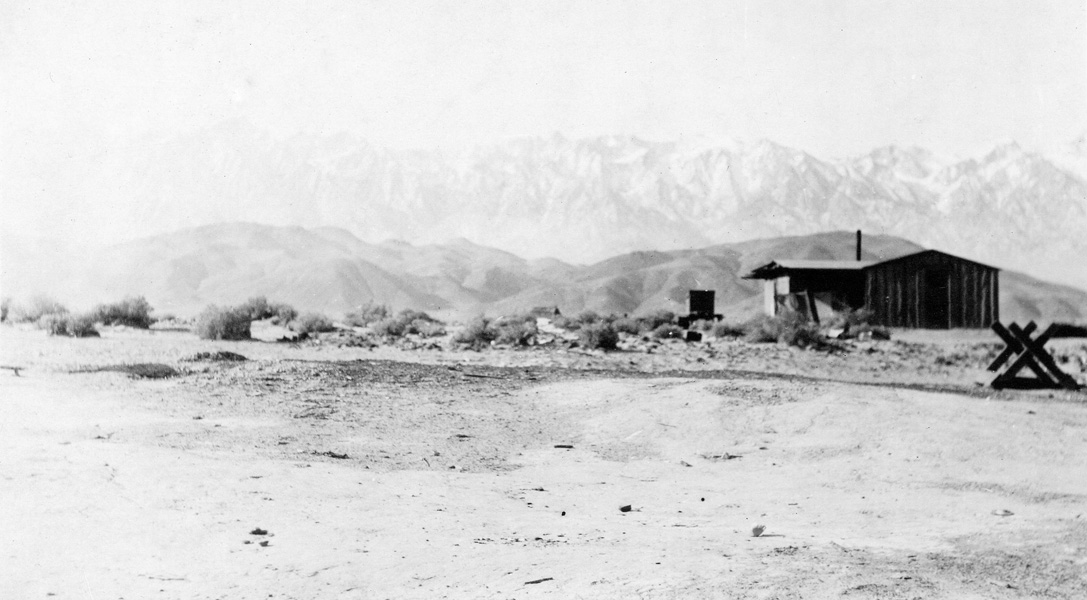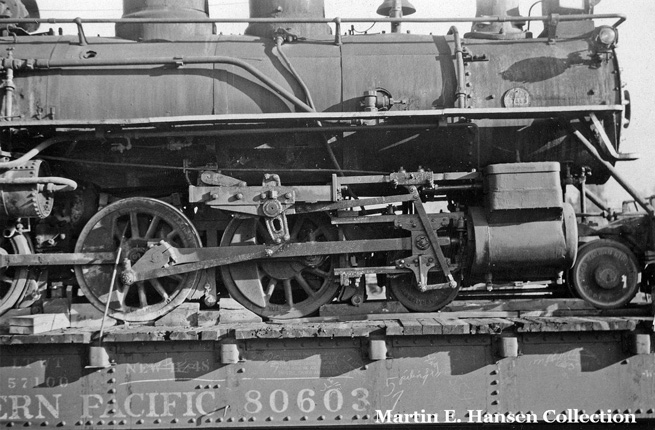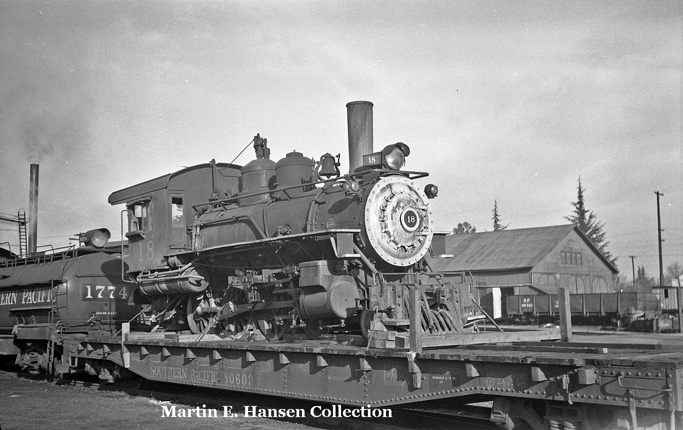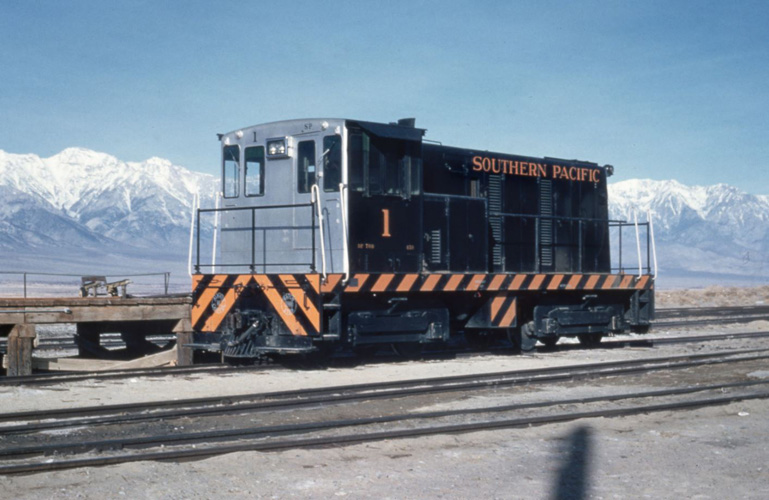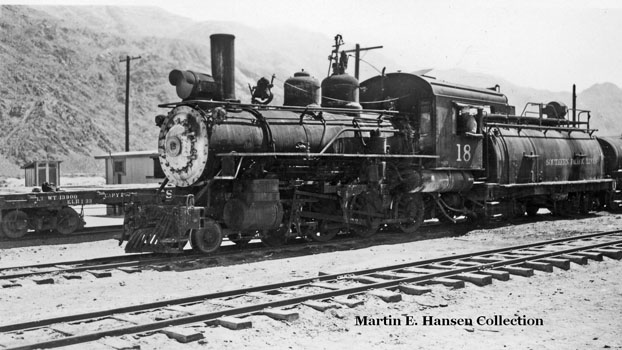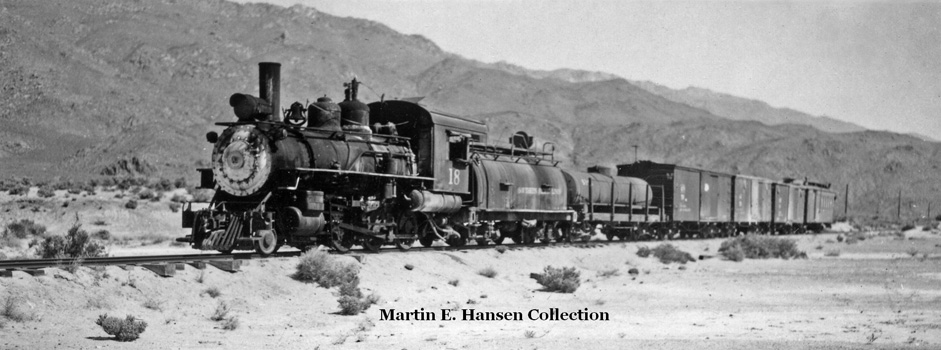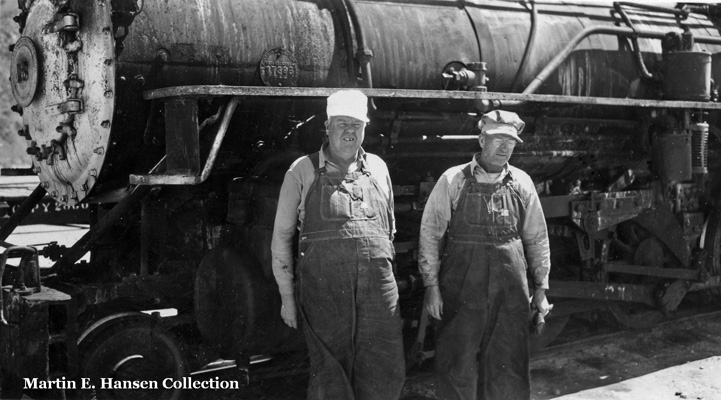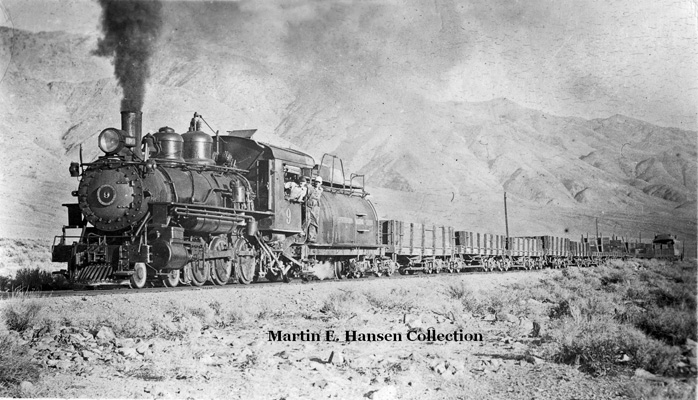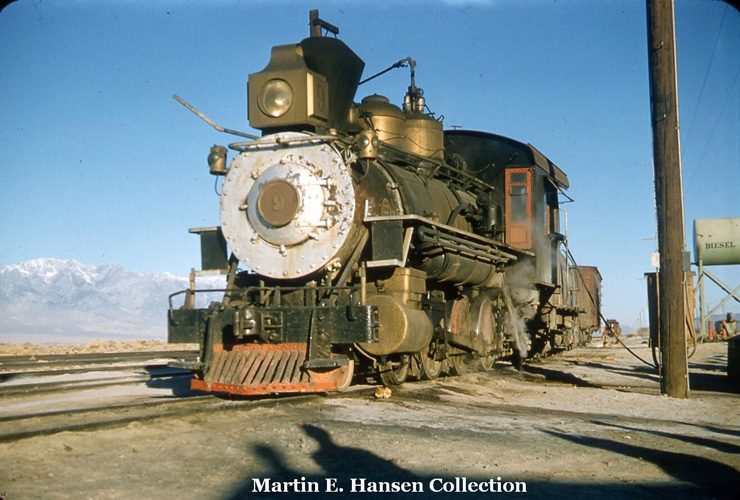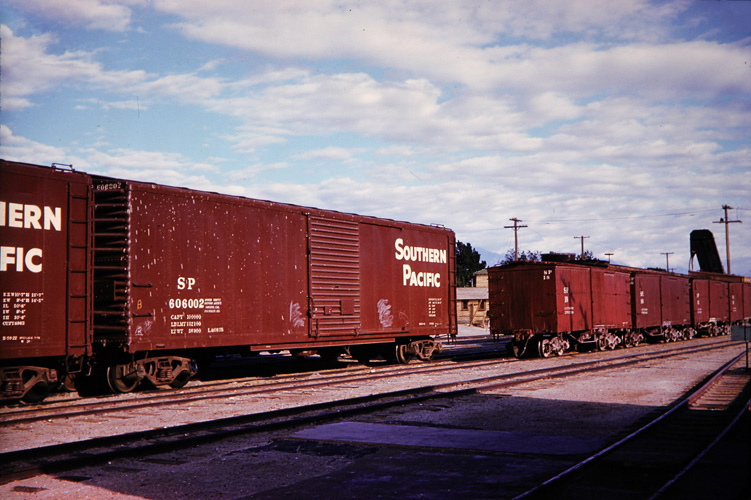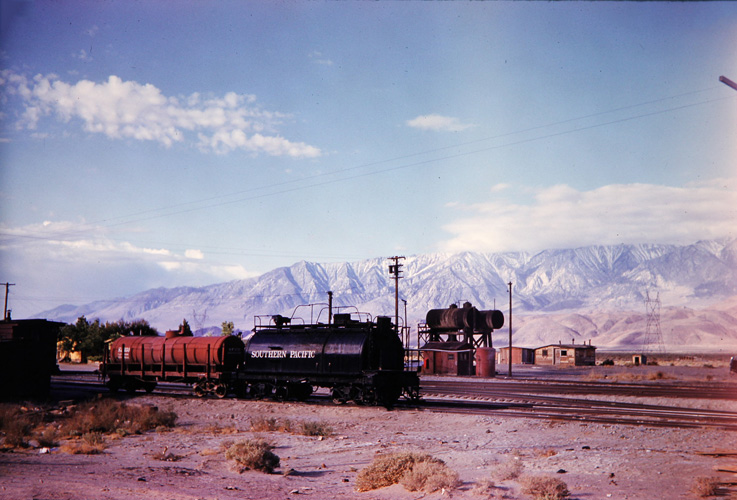


































































































































































































































































Southern Pacific Narrow Gauge Railroad |
||

|
Owenyo Mt. Whitney (Formerly Lone Pine) |
 |
All material courtesy of Rich McCutchan unless otherwise noted. See USE NOTICE on Home Page.  |
SPNG Photos from the University of Nevada Digital Archives (Photographer: Hugh Lee) |
|
Aerial photos courtesy UCSB Library Map & Imagery |
|
After thew Southern Pacific shops at Mina were closed and the line over Montgomery Pass was abandoned, the only shop that was linbked by rail to the Southern Pacific narrow gauge was Bakersfield. The connection was at Owenyo. When any of the remaining SPNG locomotives needed shopping they were loaded up on a standard gauge flat car and tied down for the trip to the Bakersfield shops. Here we see SPNG #18 loaded on a flatcar for her trip to Bakersfield. Notice how her drivers wer blocked for the trip. . (Photo and text courtesy of Martin Hansen Collection) |
|
 This image was taken at Owenyo and also shows the size difference between the standard and narrow gauge box cars. It looks like the SPNG box would fit in the SG box. The official SP car registry book shows that SPNG box car #387 became car #137 during the 1946/47 renumbering. Other published rosters have confusing information regarding this car. Two sources do state that the car was first constructed as a 28 ft car and later rebuilt to 30 ft car. This would mean a complete rebuild including new sills. (Photo and text courtesy of Dennis Burke) |
|
![]()
"An Historic Day at Owenyo"
by Joe Dale Morris
![]()
Owenyo - Where the Southern Pacific Narrow Gauge (SPNG) and Jawbone Branch of the Southern Pacific Standard Gauge Met |
|
 SPNG Derrick Car #1 that came from the standard gauge Central Pacific RR. If you look close it is much wider than the car it is coupled to. This is the wrecking/construction train you are looking at taken at Mina. The car the Derrick is coupled to is Wheel Car A-1. It was used to carry extra wheels and trucks when there was a wreck. The interesting fact is this derrick car never made it into Owens Valley. It was too wide to fit through the Mongomery Pass tunne between Mina and Laws. (text courtesy of Dennis Burke) |
|
 SP2758 at Owenyo, CA - 1946. By design or chance, the photographer accomplished two unusual things in this shot: 1. The standard gauge steam loco #2758, appears to be coupled to the narrow gauge gondola. There were no dual gauge tracks in Owenyo. 2. The smokestack on engine #2758, points straight up at Mt. Whitney. At 14,495 feet elevation, this is the high point of California, and the lower 48 states. (Photo and text courtesy of Ronald Grau) |
|
![]()
 Sagebrush and Sand |
| |
|
 On the early runs of the Slim Princess a lot of pinon wood was heaved into the firebox of the engines for producing the needed steam. This picture, taken in 1902, shows the Charley Rose crew and team making a delivery of wood. |
"Narrow Gauge to Nowhere"
by Mallory Hope Ferrell
|
When the "Little Giant" diesel came on line in 1954 it began to mark the end of an era of steam powered locomotives in the Owens Valley. Nostalgia was heavily in favor of the steam engine, but water towers at very prescribed intervals and the high cost of maintenance of the boilers and steam lines spelled doom to the steam giants. |
|
 A "condensed Princess" switches at Owenyo in 1938 |
|
 The local band played while Engine No. 18 and the new diesel engine were displayed. |
 Engine No. 18 and the new diesel engine on displayed. |
 The "Little Giant" General Electric diesel takes over in the fall of 1954. Formerly called the X-1, the Little Giant was christened with a bottle of talc! |
|
 The Little Giant was ordered in Oct. of 1953 and was shipped by General Electric to the Owens Valley on Sept. 23, 1954. She arrived on Oct. 12th, 1954 and was unloaded and set up for service at Owenyo. The unit was built around a Caterpillar D-397, V-12 engine rated at 450 horsepower (turbocharged). The engine drove 4 GE 747 traction motors through a GT-581 generator. She was 31 feet long, 9 feet wide, 12 feet wide, and carried 250 gallons of diesel fuel. She weighed fifty tons. During her short time on the Keeler Branch she wore 3 paint schemes. The first was Black with orange tiger stripes and aluminum ends. The second was Black with solid orange stripes on her frame and solid orange ends, the halloween paint. The third was lark grey and scarlet, the bloody nose paint. On April 30th, 1960, the Little Giant pulled her final train on the Keeler Branch. She was leased to the L.B. Foster Co., the firm that was contracted to tear up the line. April 1961 she was sold to the Compania Minera de Cananea in Mexico. (Photo and text courtesy of Dennis Burke). |
|
 SP 1 (Narrow Gauge GE 50-ton, b/n 32266, built 9/54) has arrived back from Bakersfield where it was sent for service work and received a new paint job - the unit was originally delivered in black with orange frame stripes and silver ends. Photo taken on the SPNG at Owenyo, CA on 08/25/59 by John West. (Photo and text courtesy of Rob Sarberenyi archives - 1954 postcard) |
|
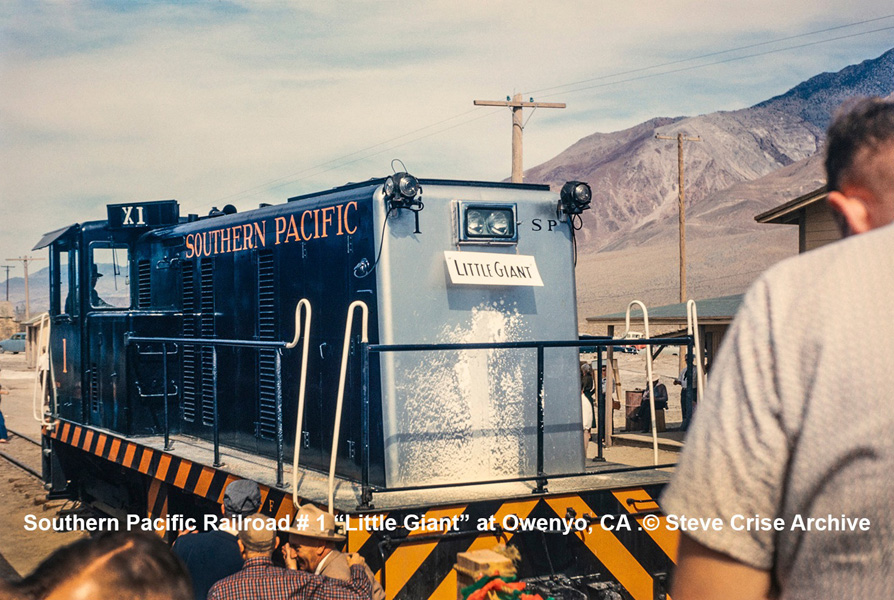 SPNG #1, "Little Giant", at Owenyo, California on October 16, 1954. She was christened with a cardboard box of talc which explains the white dust on the front of the locomotive. Talc was the main commodity that the narrow gauge railroad hauled during most of its operational life. (Photo and text courtesy of Steve Crise) |
|
| |
|
 The "Little Giant" switching at Cananea, Mexico. (Photo courtesy Duane Allen Ericson) "A while back there was a post about the Little Giant, and I wanted to share the story of this pic, and why I am relatively certain that it has been scrapped. The picture was taken around 2010, and if it is accurate that the locomotive was scrapped, this may be the last known picture (I hope I am wrong.). I was writing a book on the narrow gauge railroads of Sonora, Mexico, and knew I needed current pics of the locomotive as it was such an important part of the story, and was well known. I had written the mining corporation several letters in English and Spanish, asking permission to photograph the diesel, but no response. At one point I even tried to bribe the watchman to take a few pics for me. Around 2010, the mine was closed due a strike. Strikes in Mexico are very different than in the states: In Mexico the strikers physically take possession of the property and management flees as there is often violence. An old friend of mine in Arizona had an uncle who was one of the strikers, and through him it was arranged for me to visit the locomotive. Long story short, that’s how I was able to get permission to get onto the locked mining property and photograph the locomotive. I also got tangled up in a cartel gunfight on that trip, but that’s another story. When I returned home I was disappointed to find that only four pics of the locomotive survived as the SD card in the camera failed after this photograph." Duane Allen Ericson - April 2020 |
|
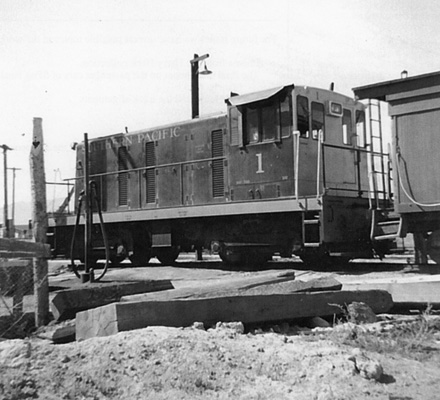 In August of 1958 long time Southern Pacific Narrow Gauge Historical Society member Harry Heck visited the Owens Valley and captured on film many of the structures and pieces of equipment along the narrow gauge line. Harry has allowed our Society to publish for the first time many of his photographs which we will do beginning in the upcoming Issue #91 of the Journal. Here is an image of SP second Number 1, the "Little Giant" at Owenyo on August 2, 1958. (Photo and text courtesy of the Journal of the Southern Pacific Narrow Gauge Historical Society) |
|
 Owenyo Railroad Yard |
 |
|
 |
|
 |
|
 |
|
 |
|
 |
|
 |
|
 |
|
 |
|
 |
|
 |
|
 |
|
 |
|
 |
|
 |
|
 |
|
 (Drawing by Carl Fallberg) |
|
 (Drawing by Carl Fallberg) |
|
 (Drawing by Carl Fallberg) |
|
 (Drawing by Carl Fallberg) |
|
 (Drawing by Carl Fallberg) |
|
"Farewell to the Slim Princess"
by John B. Hungerford
"Author's Footnotes to 4th Edition of The Slim Princess"
by John B. Hungerford
Offerings Gleened off of Ebay |
|
 Families of railroad employees at Owenyo posing for a photo in front of homes made of boxcars. (Photo courtesy Eastern California Virtual Transportation Museum) |
|
 Going through a disc of pics I have not looked at in a long time and finding some interesting views. This one taken atop a NG box car at Owenyo. Check out the little crane type thing on the right in the SG box car. You can also clearly see the difference between the narrow and standard gauge tracks in this view.....3 foot gauge on left and 4 foot 8 inches on the right. (Text and Photo courtesy of Dennis Burke) |
|
|
|
 Owenyo Station during busier days |
 Owenyo Station |
 A northbound train approaches Owenyo Station in 1954. |
 View of the Owenyo yards looking north from the narrow gauge transfer trestle/ Dennis Burke PHOTO of same scene. Looking north down the Owenyo Transfer Trestle. Owenyo in the background. Rolling stock, including baggage car #12, are sitting on the turntable spur. Turntable since removed. Just to the right of the turntable spur you can see the county road which you can drive on to this date. Standard gauge left hand side. (Text courtesy of Dennis Burke) |
 Owenyo Station at milepost 559.8, was the junction point between the narrow gauge and the standard gauge "Jawbone Branch" from Mojave. The yard above did not contain any dual gauge trackage. |
 Combine-caboose 401 stands by the Owenyo depot, while her crew switches the yard. The word Owenyo is a contraction of the words "Owens" Valley and "Inyo" County. |
 While Owenyo was the transfer point between the three foot and standard gauge branches, there was no dual gauge trackage. The operations were directed from the small office, complete with old crank telephone, ancient Remington, waybills and rock collection on window sill. |
 Owenyo Station transfer trestle. |
 Engine No. 9 switches a string of "A" frame hoppers, loaded with soapstone on the narrow-gauge-to-standard-gauge transfer trestle in 1959. |
 Owenyo Station transfer trestle, 1939. When the standard gauge "Jawbone Branch" was completed to Owenyo in 1910, interchange facilities were constructed at the new junction, as well as a depot and hotel. At the south end of the yard a transfer trestle was built to allow minerals to be dumped from the narrow gauge cars into broad gauge equipment. |
 Engine No. 18 on the Owenyo Station transfer trestle. |
 Owenyo Station transfer trestle. |
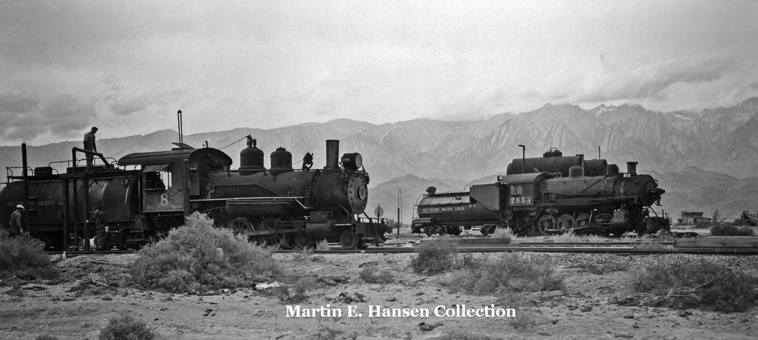 The servicing facilities at Owenyo, California for the Southern Pacific narrow gauge Keeler Branch and the standard gauge Jawbone Branch we separate for obvious reasons. However, they were in close proximity to each other as we see in this photo of SPNG #8 taking on oil while SP standard gauge #2853 stand at the nearby standard gauge serving facility. (Photo and text courtesy of Martin Hansen) |
|
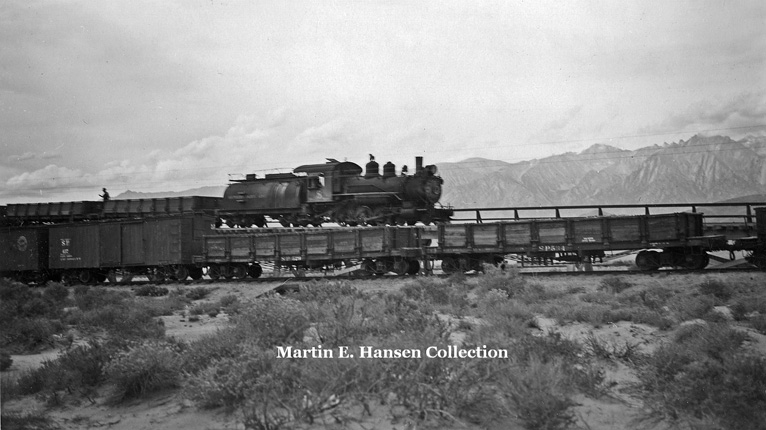 This photo shows an interesting perspective. At first we think that Southern Pacific narrow gauge 4-6-0 #8 is sitting on top of that gondola car. We look closer and see that #8 is actually on the transfer trestle at Owenyo, California. The date is October 9, 1942. (Photo and text courtesy of Martin Hansen) |
|
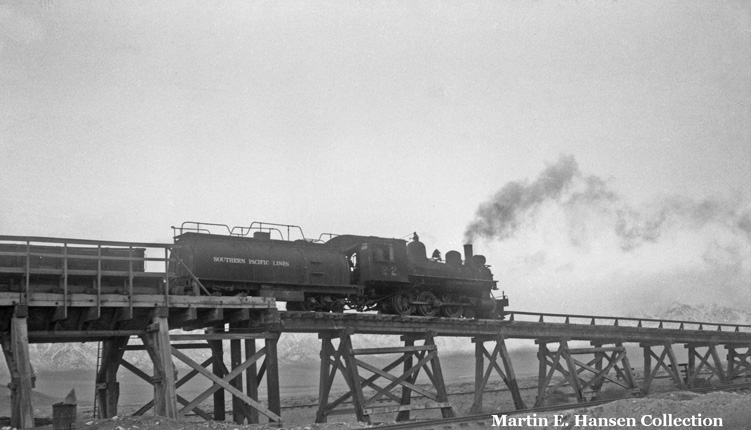 A cold November day in 1942 finds snow hitting the Sierra Mountains in the background while Southern Pacific narrow gauge 4-6-0 #22 works the transfer ramp in Owenyo, California. Engine #22 was built for the Florence & Cripple Creek Railroad in Colorado and then went to the Nevada-California-Oregon Ry before becoming SP #22 as we see here.. (Photo and text courtesy of Martin Hansen) |
|
Owenyo Offerings from Ebay |
|
 The cabs of steam locomotives came in nearly as many sizes as the locomotives themselves. Thus the crews assigned to each different engine had to grow accustom to the working space provided as best they could. Here we see Walter "Fergie" Ferguson making adjustments in the cab of his favorite charge, Southern Pacific's narrow gauge 4-6-0 #9 at Owenyo, California in August 7, 1959. As we see, the little narrow gauge 4-6-0 does not give her crew much extra space to work. Couple this with the heat coming off the boiler during operation together with the desert heat that the Keeler Branch was known for, and you have the makings for a long day in the cab! Despite these working conditions, and the fact that SP's 50-ton GE diesel had arrived on the property in 1954 to replace these old steam pots, Fergie loved any chance he got to run #9 when the diesel had to go back to Bakersfield for servicing. Can you blame him? (Photo & text courtesy of Martin Hansen) |
 Slim Princess #9 in Owenyo (Photo courtesy of Southwest Railway Museum Association Collection) (Jarod Black) Paul Gomez writes: My families first house was near the high tower building underneath the tall trees. I lived in Owenyo from 2nd grade until the railroad line was abandoned by Southern Pacific Railroad Co. in 1960. |
 Martin Hansen: "In this present age of modern mainline railroads with thousands of miles of track in operations, the thought of one of them keeping in service a rickety narrow gauge steam rail line located in a desolate and isolated area is hard to imagine. However, roll the clock back some 60 years, and this is exactly what was happening in the dry Owens Valley of Eastern California. It was there in the late 1950's that the mighty Southern Pacific hung onto the former Carson & Colorado narrow gauge railroad operating then as the Keeler Branch. Not only was this the only narrow gauge part of the SP at the time, it was also the last portion of the SP to see steam as motive power in regular operation. Even though SP had fully dieselized and retired all steam power by the fall of 1958, the Keeler Branch hung on with narrow gauge 4-6-0 #9 operating as active back-up power for the 50-ton GE diesel that AP had put into service in 1954. So remote was the Keeler branch, that SP had to load up the last of the operating steam power onto standard gauge flatcars for the trip to the SP shops at Bakersfield, California whenever they were in need of service. We see SP #9 returning from a servicing at Bakersfield in this photo taken in the mid-1950's. This ritual would continue until August 25, 1959 when #9 would make the very last revenue steam run of any SP steam locomotive. Now that steam has been gone from the SP for some 60 years and the SP as a seperate railroad is no more, it is nice to remember when even a big mainline railroad could still think on a small scale." (Photo courtesy of Dillon Trinh) |
 (On the standard gauge, switching the north end of Owenyo yard, February,1951. View is looking NW. The two tracks on the right are narrow gauge. I believe, the diagonal track under the locomotive tender is the track leading to the standard gauge / narrow gauge transfer dock. (Photo and text courtesy of Ronald Grau) |
|
Photos courtesy Pacific Southwest Railway Museum Association Collection (Jarod Black ) |
|
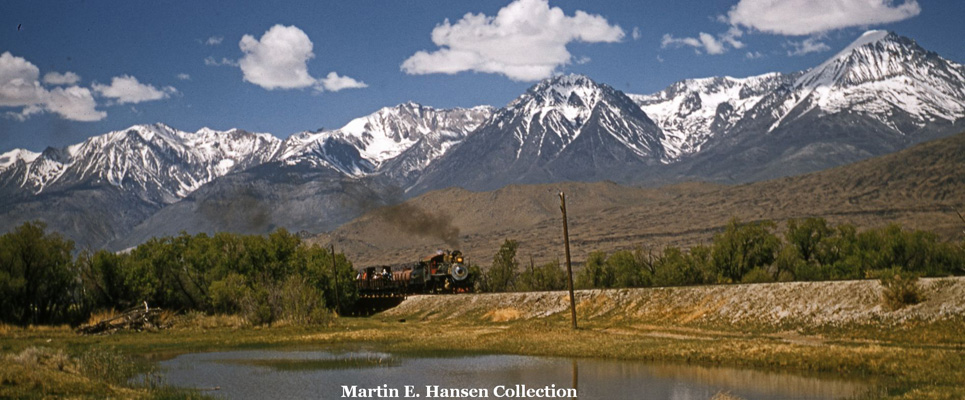 Southern Pacific narrow gauge #9 ran one excursion while she was wearing her horribly gaudy paint and backdated stack and headlight. Here is that excursion at Independence, California on May 30, 1957. The backdrop of the snow covered Sierra Mountain Range helped to soften the look of #9 on this day. (Photo and text courtesy of Martin Hansen) |
|
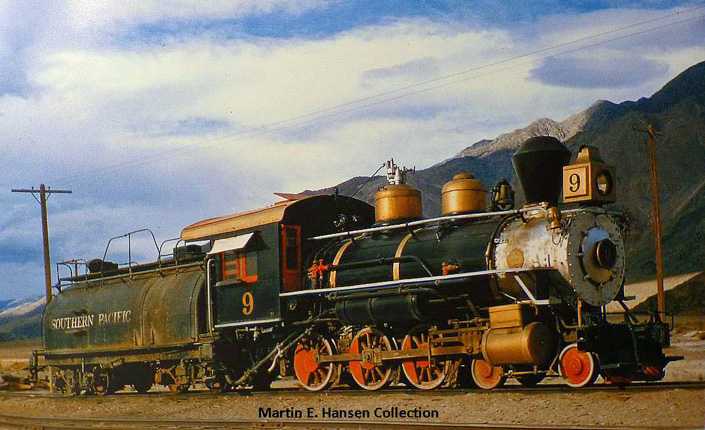 I am still amazed at how many folks her did not know about the failed attempt by the Southern Pacific shop crew at Bakersfield to "back date" SP narrow gauge 4-6-0 #9. In September, 1956 #9 was sent to the SP shops in Bakersfield for it annual shopping. It was at that time that shop foreman, E. A. McCutcheon decided to add this treatment to #9. Here is a full view of the locomotive in 1957 after the gaudy pant, fake stack and headlight were applied. Note that there was no attempt to do any backdating on the tender. That made the engine look even more bizarre to railfans and SP crews. Also, many of the small communities that were served by the Keeler Branch complained directly to SP and caused all of this to be removed in her next shopping in late 1957. (Photo and text courtesy of Martin Hansen) |
|
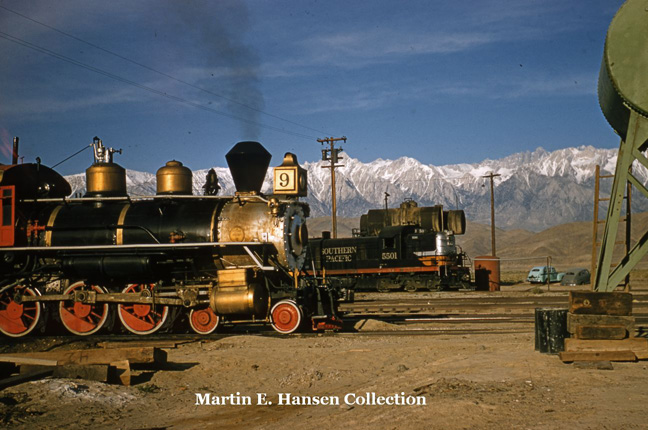 May 30, 1957 finds a contrast in motive power on the Southern Pacific at Owenyo, California. In the foreground we see SPng 4-6-0 #9 after her return from a shopping at Bakersfield that saw her given some quite hideous "backdating" that was not well received by either railfans of the SP crews on the Keeler Branch. In the background is a much newer first generation diesel in the form of SP #5501 decked out in her Black Widow paint scheme. Ironically, it was the much older SPng #9 that survives today. (Photo and text courtesy of Martin Hansen) |
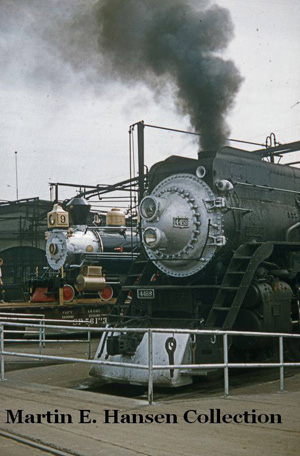 My cover photo of Southern Pacific narrow gauge #9 has caused more of a stir than I would have thought. Many people have commented that this garish paint job with fake stack and headlight "must have been for a movie". That is NOT correct. This was NOT done for ANY movie. The shop forces at Bakersfield knew that #9 had drawn many railfans to the Keeler Branch in recent years to photograph what would become the very last SP steam locomotive in service. The shop forces decided to do this "back dating" for the benefit of the railfans. This work was met with uniform criticism from both ralfans and the crews on the Keeler Branch. The back dating only lasted until the #9 was returned to Bakersfield for her next shopping. Here we see #9 loaded on a standard gauge flatcar at the Bakersfield roundhouse for the trip to Owenyo after the back dating had been applied. (Photo and text courtesy of Martin Hansen) |
Photos and text courtesy of Martin Hansen |
|
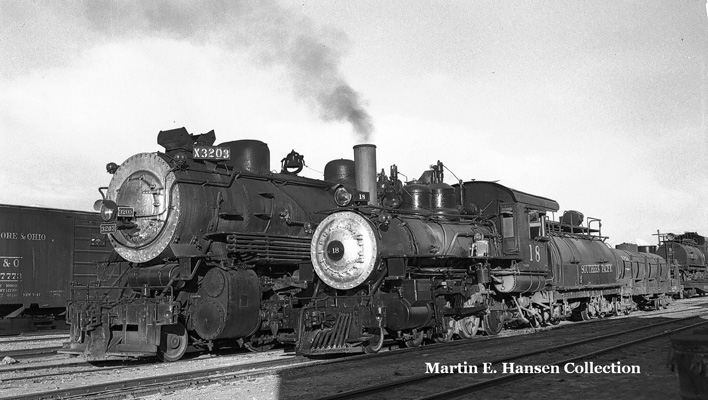 Size comparison of SPNG #18 and Standard Gauge #X3203 This is one of the best photos ever taken to show the size comparison between Standard gauge and Narrow gauge steam motive power. This photo was taken at Owenyo, CA and shows Southern Pacific standard gauge #X3203 towering over SP narrow gauge #18. 3 |
|
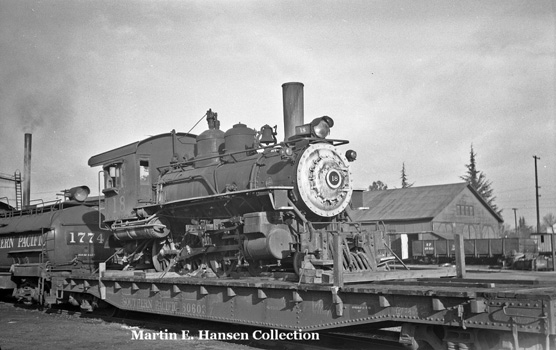 OAt first glance this photo is interesting because it shows how Southern Pacific shipped their narrow gauge steam locomotives from the Keeler Branch back to the shops at Bakersfield, California for shopping. Then we take a minute and notice that both of these SP locomotives shown here, have ones that survived the scrapping tendency of the 1950's and lived to see the next Century. Back when this photo was taken, it was just a chance to capture 2 steam locomotives together. Who could have known how lucky these 2 would be - #18 and #9. w |
|
|
|
Early Bishop Residents | |
|
|
Mary Austin | |
More, Owens Valley - Southern Pacific and Carson & Colorado Railroad |
|
|
|
|
More Saline
Valley Saltworks Tramway |
|
|
High Sierra Pack Stations |
|
|
|
Willie A. Chalfant |
|
Sign Guestbook View Old Guest Book Entries Oct 1999 - Feb 2015 (MS Word) |
 CONTACT the Pigmy Packer |
View Guestbook View Old Guest Book Entries Oct 1999 - Feb 2015 (PDF) |




